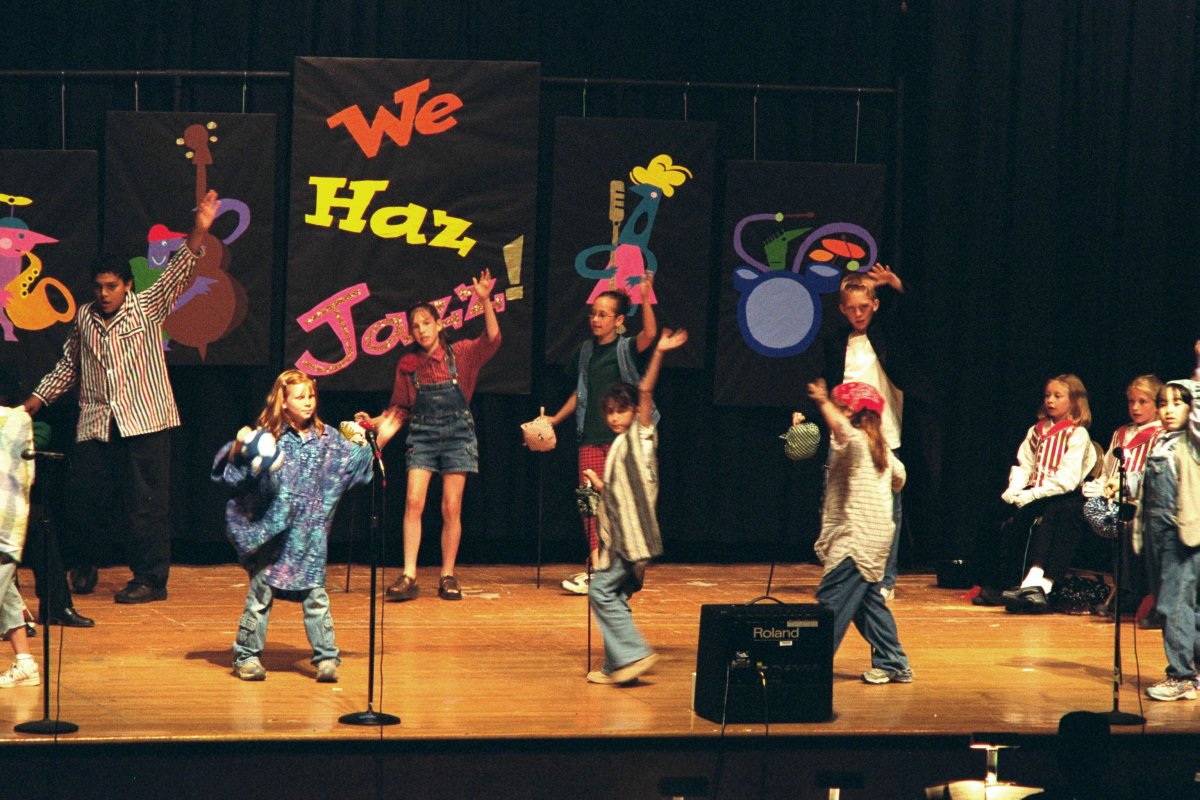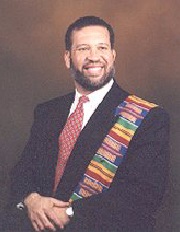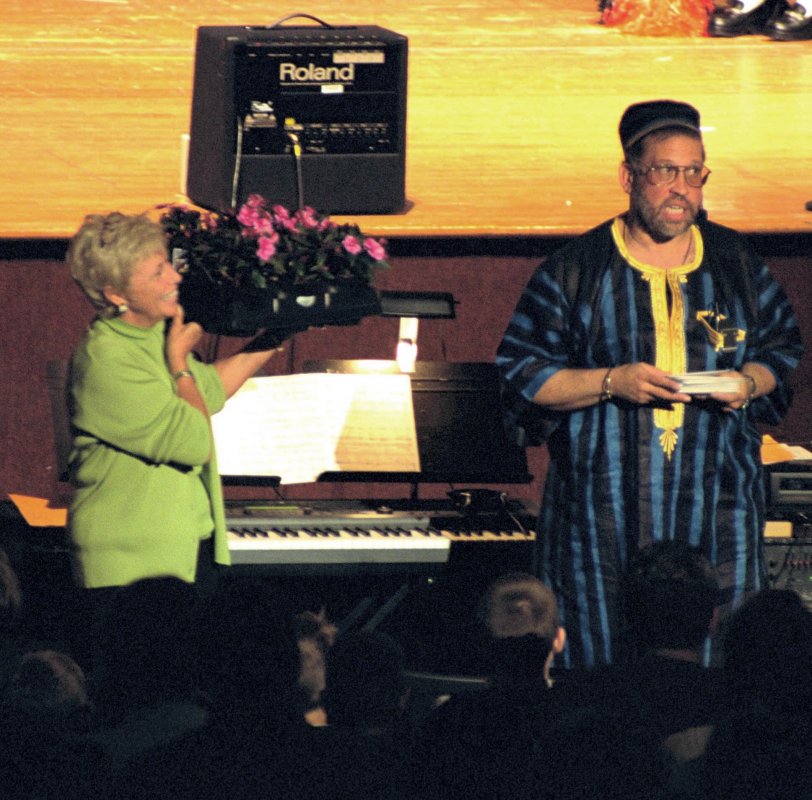Some teachers’ gifts reach beyond the classroom. At Poolesville Elementary, one such teacher is the Music Man.
♫“HOBO SWING, cuttin’ up a rug tonight,
Hobo Swing, we’ve arrived,
Hobo Swing, crankin’ up the Fahrenheit,
You’re gonna dig…jive!”♫
Onstage, a boogie-woogie production number suddenly ends, and a dozen left hands fly up. With a gentle press of my Ricoh’s shutter, I capture the moment on film.
Here at Poolesville High, the auditorium is filled to capacity with parents like me. Our kids attend Poolesville Elementary School (PES), and we’ve gathered at the town’s largest stage to watch them sing, dance, and act their way through the PES 2002 Spring Concert.
Seasons come, seasons go, and with them the faces of the PES performers. But not the face of their baton-waving concertmaster, Bill Harris. Since 1975, Harris has been shepherding young PES minds and hearts toward a lifelong appreciation of the lyrics, tunes, and rhythms that define their country and help them understand why it is what it is.
His students, and many of their parents, regard him with an affection usually reserved for a charismatic drama teacher. This devotion is all the more unusual because Harris seldom smiles, even when reproaching an inattentive or slothful child in a dry humor that masks his disappointment.
I came to know him more personally five years ago, after writing my first musical play, Marriage At Work. Harris, I’d learned, was an occasional dinner-theater performer and a compensated section leader/soloist for a church choir. I needed a tenor to record two roles for my demo tape, and the music teacher stepped up. I began to call him Bill. My girls wanted to die. Now they brag, “Mr. Harris sang for my stepdad’s musical.”
Not surprisingly, Harris is often likened to the devoted music teacher embodied by Richard Dreyfuss in Mr. Holland’s Opus. Like Glenn Holland, he enlists every device from the Beatles to Bach to bells to reveal musical expression, culturally and artistically, in its manifold forms.
Harris doesn’t mind the comparison; Holland is a favorite film. As a boy, Harris was tooled around DC in his father’s white ’65 Dodge Coronet 440, Holland’s Driver’s Ed car.
While Harris encourages kids to play an instrument—my Alexa and Vicki took up piano—he cares little how many will earn their living at it. He just hopes they come to understand that music is more—much more—than the latest pop hit. Where else do kids learn to perform the Macarena to Sousa’s “Stars and Stripes Forever” in the Fall, sing Beethoven’s “Ode to Joy”—in German—in the Winter, and dance in a 1940s-style jazz jam session in the Spring?
When leading a concert, Harris usually is garbed in an African robe and embroidered Kampala hat. World music matters, he maintains, because we are a nation of immigrants. To understand our polyglot jukebox, we must know the music that informed us and formed us. Winter Concerts feature songs from Christmas, Hanukkah, and Kwanzaa.
A recent concert honored the roots of Rock and Roll. I’m talking Chuck Berry, Jerry Lee Lewis, girls jitterbugging in poodle skirts and patent leathers, and a glittering, 4-foot-11 Elvis in blue suedes, Thank-you-very-much.
American music likewise was the theme of a previous concert, an evening of home-grown tunes like “Polly Wolly Doodle,” “Erie Canal,” “Boogie Woogie Bugle Boy,” “This Land is Your Land,” “God Bless the USA,” and the Shaker hymn “Simple Gifts,” which American composer Aaron Copland wove into the ballet suite Appalachian Spring.
Tonight celebrates a music genre uniquely American: Jazz. The selections reflect the time of the Underground Railroad as told by the music of Joplin, Armstrong, Ellington, and Holiday. The costumes, coordinated by parent volunteers, are stunningly authentic. The brassy prerecorded instrumental accompaniment—enhanced by live keyboardist Cindy Galloway, a special-education assistant—has the kids grinning, their families toe-tapping. Thanks to Aileen Dunkleberger, a fourth-grade teacher and volunteer choreographer, we’ve never seen so many ordinary kids—our kids—perform such extraordinary dancing.
I’m the photographer of record, watching the evening unfold through a telephoto lens. But as “Hobo Swing” ends, I find myself dewy-eyed, like a prom-goer hearing the sax herald the final dance. Like Vicki before her, Alexa was Harris’s pupil for 5 years. For our family, the last page is turning, closing the book on an eight-year chapter of our family story.
Tonight the concertmaster leads sans ceremonial robe. In its place, a striped African tribal Kente cloth is slung over one shoulder. Robed or not, at 49 Harris looks every inch the tribal elder, standing dignified, turning slowly, speaking in measured cadences.
As the final number ends, I remember the riotous tribute that closed the Winter Concert: As Harris stepped onstage to accept his bouquet, his students chanted, “Go, Harry! Go, Harry!” Will tonight be a rowdy reprise? Alas, no. To my dismay, dignity prevails until after the curtain falls.
My gear is packed. As the crowd thins, my wife approaches. “Ready, Camera Man?” she smiles.
“In a minute,” I say. “I want to tell Mr. Harris I’ll be sending him the pictures.”
“He knows,” she says; “You always do.”
I know. But I also want to say: This was your finest hour.
I wait while proud parents thank him. Then I approach the dais, where Harris is conversing with Aileen. Before I can catch his eye, he departs toward the stage exit. A private man, he prefers the door less traveled.
“Bill!” I shout. “Bill!” But my calls fail to register; his ears are unattuned to being addressed by his given name.
Dammit. After eight years, I’m too late. Too late to tell him how he’s outdone himself. How the prints will be ready soon. How Alexa—and her parents—already miss him.
Like Glenn Holland, Bill Harris didn’t plan to teach his early students’ sons and daughters, to park in one space 27 years while his dark-brown hair turned salt-and-pepper. He stayed, I think, because we wouldn’t let him go. Why stop the music when it still has something fresh to say? A quarter-century is the stuff of standards; it’s a good run for any song.
For 90 families, the song is over, but the refrain goes on.
© 2002 Paul Franklin Stregevsky






